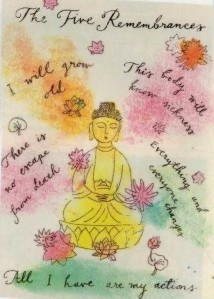I recently facilitated a memorial service for my mother’s sister who lived to the goodly age of 100. My Aunt Jeannette Marie was a loving daughter, mother to 6 children, a grandmother, great grandmother and wife to two husbands.

She was one of those people who would light up and make you feel good whenever you were in her presence. She always had a good word for everybody and even though she suffered tragedy in her life – her first dying in a train accident when he was just 24 – it was not in her nature to complain, choosing instead to focus on her many blessings.
With her sister’s passing, my mother, at 91 years old, became the last surviving person of that close 10 member family clan she grew up with. My mother was close to her sister and loved her dearly so it is natural that she is experiencing feelings of sadness, loss and grief. Especially because she no longer has anyone in her life who she can talk to about the “old days” and all the good and bad times they went through together as a family.
To begin the memorial service, I asked my wife to recite the poem ‘Tis a Fearful Thing’ that is believed to have been written by a Jewish Rabbi sometime in the 11th century. It is a moving poem about the intersection of grief and faith and love and it is often shared by Hospice teams with the families of those who are grieving a loved one who is nearing death.
‘Tis a Fearful Thing
‘Tis a fearful thing
to love what death can touch.
A fearful thing
to love, to hope, to dream, to be –
to be,
And oh, to lose.
A thing for fools, this,
And a holy thing,
a holy thing
to love.
For your life has lived in me,
your laugh once lifted me,
your word was gift to me.
To remember this brings painful joy.
‘Tis a human thing, love,
a holy thing, to love
what death has touched.
One of the Five Remembrances that Buddhists contemplate during their meditation practices is this one:
I will be separated and parted from everyone and
everything that is dear to me
Anyone who lives long enough knows the pangs of sadness that come with loss. From the moment we are born and bond with our parents, grandparents and siblings; fall in love; marry; have children of our own—we are destined to endure the pain of losing someone we love—over and over again. My mother, at this point in her life, has had to say painful goodbyes to her husband, parents and 7 of her siblings, not to mention many close friends.
It’s enough to make you think that life is just an elaborate setup for suffering. But somehow we still manage to choose life. We choose to make friends, marry, bring new life into the world. We lose a spouse or partner and we decide to give our hearts to a new companion, opening ourselves up to more eventual sorrow. Are we in denial to think that death will not touch this new love too?
Why do conscious and highly intelligent beings make themselves vulnerable to the eventual pain and sorrow that comes with losing the one you love. Is love really something for fools? Is it not insanity to do the same thing over and over again and expect a different result?
What is it that makes us choose to invest in love and life? The poem teaches us that it all comes down to love – because it is ‘a holy thing to love.’ Love, life, death and love again is what it means to be human.
The poem’s closing words reflect a profound truth that speaks to the resilience of the human spirit and the best character traits of the human species:
It is a human thing, love
a holy thing, to love what death has touched.
Love survives death. Death destroys the body but it does not touch love—or erase love. The body is impermanent but Love is eternal. We somehow know at the deepest level that life is about love. It may be that our divine purpose is to love, no matter how painful the loss of a loved one will be, and to send that love out into the heavens.
We choose to deeply love someone because we believe and trust that it will always keep us connected. Love becomes the unbreakable tether between those of us “here” and those who have passed on. It is knowing this that enables us to overcome our fear of the certainty of death and separation.
To love deeply is holy. Holy. Love keeps us connected to the Creator of all Beings, to all of those we have loved and all those to come. Even though my mother is sad when she thinks about all the loved ones in her life who death has touched, she still feels a holy connection with them which helps season her grief with painful joy and a spiritual component of hope that leads her to believe she will be reunited with them someday in the afterlife.
Let us embrace that love which is not severed by death. Painful, fearful, a thing for fools? Perhaps. Perhaps for some, at first. But it is also a holy thing… A holy thing to love.

 me. It brings to the forefront things like the impermanence of life that most people tend to block out of their daily consciousness – and it helps me to consider that all my actions will live on in some way and have ripple effects in the world.
me. It brings to the forefront things like the impermanence of life that most people tend to block out of their daily consciousness – and it helps me to consider that all my actions will live on in some way and have ripple effects in the world.